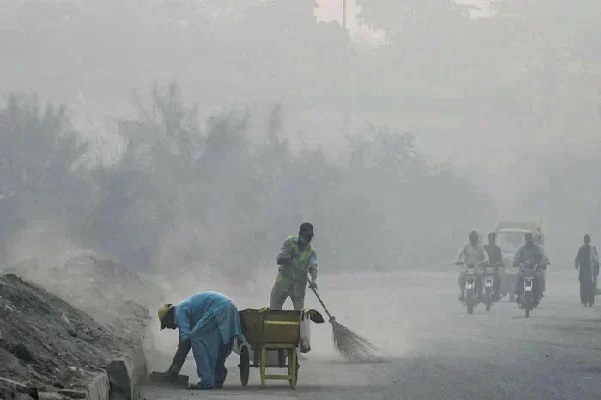LAHORE: The Punjab government imposed a “green lockdown” in designated smog hotspots across Lahore on Wednesday, imposing restrictions on barbecue joints, motorcycle-rickshaws and marriage halls — measures described as insufficient and poorly planned by air quality experts.
The government has announced the plan in an effort to control rising pollution levels in the city, which continues to rank among the world’s most polluted cities.
On Wednesday, the city’s Air Quality Index (AQI) peaked at 588 at 3am, with levels varying across different areas. The lowest AQI recorded was below 200 from 5pm to 6pm, although this still exceeded international standards for healthy air. By 8pm, the reading was 177, a marked improvement compared to the previous two days.
Punjab’s senior minister Marriyum Aurangzeb, speaking in the Punjab Assembly, announced that 11 areas in Lahore had been identified as smog hotspots, with Shimla Hill being the most affected. She confirmed that the “green lockdown” would take effect from Thursday (today).
Earlier, the director general of the Punjab Environmental Protection Agency, Dr Imran Hamid Sheikh, issued the green lockdown notification. Pollution hotspots include major roads such as Davis Road, Egerton Road, Durand Road, Kashmir Road, Abbott Road, starting from Shimla Hill to Gulistan Cinema, Empress Road, starting from Shimla Hill to Railway Headquarters, and Queen Mary Road, starting from Durand Road to Allama Iqbal Road.
Under the green lockdown, all construction activities within a one-kilometre radius of Shimla Hill are banned. The use of commercial generators and Qingqi motorcycle-rickshaws is restricted, while open barbecue activities are prohibited after 8pm.
Similarly, food outlets using charcoal, coal or wood without proper emission control systems are required to cease operations. Marquees and marriage halls must close by 10pm, and only wet sweeping will be done by the Lahore Waste Management Company (LWMC) to reduce dust. Moreover, encroachments will be removed to ensure smooth traffic flow, heavy transport vehicles will also face restrictions, and half of office employees will work from home.
Ms Aurangzeb said the government plans to establish a “green ring” around the city using modern technology as part of the Lahore Green Master Plan. This initiative will create a “wall of trees” to reduce carbon emissions and increase oxygen levels.
She said every tree would be geo-tagged and afforestation in industrial areas will be intensified. Collaboration with industries will be prioritised to expand tree plantations, with educational institutions and students participating in a “Green Force” during the three-month smog season.
The government was also cracking down on environmental violations, she said, adding that two factories were sealed and fines totalling Rs 200,000 were imposed.
Besides, three brick kilns and four plastic melting plants were demolished and several food outlets in Model Town sealed due to excessive smoke emissions.
Trolleys carrying sand and soil are now required to use covers to reduce dust on the roads, while 296 vehicles were fined a total amount of Rs592,000 and 102 vehicles were impounded.
To further reduce pollution, the introduction of 30 electric buses and e-bikes in Lahore has been announced. The Punjab Safe Cities Authority is also issuing daily e-challans to vehicles emitting excessive smoke and taking action against individuals involved in waste burning.
However, the Pakistan Air Quality Experts’ Group, comprising leading air quality experts, researchers, doctors and scientists, has criticised the measures as insufficient and poorly planned, arguing they are unlikely to have a measurable impact on reducing air pollution.



